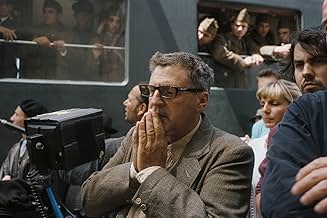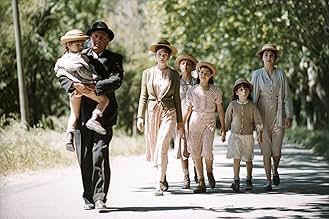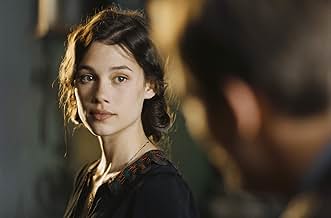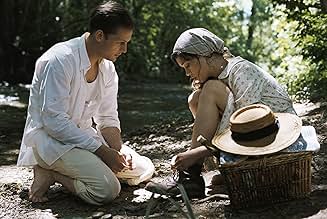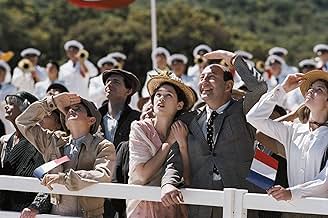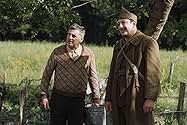IMDb-BEWERTUNG
7,0/10
4362
IHRE BEWERTUNG
Im Südfrankreich der 1930er Jahre ist ein Vater zwischen seinem Ehrgefühl und seiner tiefen Liebe zu seiner Tochter hin und her gerissen, als sie mit dem wohlhabenden Sohn eines Ladenbesitze... Alles lesenIm Südfrankreich der 1930er Jahre ist ein Vater zwischen seinem Ehrgefühl und seiner tiefen Liebe zu seiner Tochter hin und her gerissen, als sie mit dem wohlhabenden Sohn eines Ladenbesitzers in Schwierigkeiten gerät.Im Südfrankreich der 1930er Jahre ist ein Vater zwischen seinem Ehrgefühl und seiner tiefen Liebe zu seiner Tochter hin und her gerissen, als sie mit dem wohlhabenden Sohn eines Ladenbesitzers in Schwierigkeiten gerät.
- Regie
- Drehbuch
- Hauptbesetzung
- Auszeichnungen
- 2 wins total
Empfohlene Bewertungen
Remaking a Pagnol film is asking for trouble. Film snobs will dismiss the remake without giving it a chance, though 60 years ago those same film snobs probably dismissed Pagnol as a film director, finding him hopelessly inferior to Renoir or ... Afficionados of Raimu, an unquestionably great actor - when he had a good role - will say that no one can do what he did. And they would be right; no one can out-Raimu Raimu. A force of nature, because Raimu at his best was a force of nature, cannot be imitated or equaled. But a role can be done a different way, even if the words are the same, just as different great actors can succeed at Hamlet or King Lear. And yes, I speak of Shakespeare. Theater/literature snobs can guffaw, but who cares? Let them go about their business.
And I will go about mine, which is to talk about this movie, which is remarkably moving. Moving in part because Pagnol's script was a masterpiece, yes, but also because this is a very well-done realization of it.
The first thing that struck me about this movie was the color, when you see the scenery. Pagnol, for whatever reason, really didn't do a lot with scenery in his black and white movies. This movie shows what that deprived us of. It is done in the best tradition of the color versions of Jean de Florette, Manon des sources, La gloire de mon père, and Le château de ma mère. The countryside around Salon de Provence comes alive, and is beautiful.
I was also struck by the use of music, which again is not a high point in Pagnol's version. The Italian song, so wonderfully recorded by Caruso, is used in very moving ways here. Auteuil has a better sense of how to use music in a film than Pagnol did, at least with this script.
But the heart of this movie is Pagnol's text, and this cast, a great one, does it beautifully. True, at times, as I marveled at the genius of Pagnol's text, I wondered if that meant these actors were acting it, rather than becoming the characters. That may be true in some cases, though not for Kad Merad, who becomes Philippet every bit as much as Fernandel did. I can hear Raimu reciting the lines Daniel Auteuil speaks, and beautifully, perhaps because they are so different, certainly because Raimu delivered them in a way that engraved them in my memory. But Auteuil makes them very moving as well. He is not a force of nature as Raimu was, but his Pascal is also a real character.
What I realized, over and over again watching this movie, is that the script was indeed written by a playwright, and Auteuil respects that. We still have fully-developed scenes, as movies used to have when they were still imitating theater. And, as a result, with this great script and these great actors, we have deeply moving moments, such as when Pascal says goodbye to his daughter, sending her off to raise her bastard child elsewhere. Or, even more deeply moving, when the parents of the father of her child, having just lost their son in the war, come to see the child, the last remnant of their now lost son. Every line of that scene is deeply moving: Pascal's pride in his grandson, the parents' grief and longing for their son. (I didn't care for the mother's final admission that she burned her son's letter rather than deliver it to Patricia; that was better done in the previous version.)
A film script is like a play: it can be done in more than one way, if it's worth doing - as this script most certainly is. It will not wipe away memories of Pagnol's 1940s version, nor should it. You don't have to forget Olivier's Hamlet to love Jacobi's, or Branaugh's, or ... I suspect the very film snobs who dismiss Pagnol's own work will cause this film not to enjoy the success it deserves, but that would be a real crime. This is, in fact, a wonderful realization of Pagnol's very beautiful, very wonderful script.
---------------------------------
I watched this movie again this evening, and really have nothing to add to what I wrote before, other than to say that it is a beautiful realization of Pagnol's script. Auteuil, Merad, and Darroussin are three of modern French film's finest actors, and they all give first-rate performances here. The often wonderful dialogue is delivered as in a great movie or play, lovingly and beautifully. Watch this. It's a deeply moving and wonderful movie.
And I will go about mine, which is to talk about this movie, which is remarkably moving. Moving in part because Pagnol's script was a masterpiece, yes, but also because this is a very well-done realization of it.
The first thing that struck me about this movie was the color, when you see the scenery. Pagnol, for whatever reason, really didn't do a lot with scenery in his black and white movies. This movie shows what that deprived us of. It is done in the best tradition of the color versions of Jean de Florette, Manon des sources, La gloire de mon père, and Le château de ma mère. The countryside around Salon de Provence comes alive, and is beautiful.
I was also struck by the use of music, which again is not a high point in Pagnol's version. The Italian song, so wonderfully recorded by Caruso, is used in very moving ways here. Auteuil has a better sense of how to use music in a film than Pagnol did, at least with this script.
But the heart of this movie is Pagnol's text, and this cast, a great one, does it beautifully. True, at times, as I marveled at the genius of Pagnol's text, I wondered if that meant these actors were acting it, rather than becoming the characters. That may be true in some cases, though not for Kad Merad, who becomes Philippet every bit as much as Fernandel did. I can hear Raimu reciting the lines Daniel Auteuil speaks, and beautifully, perhaps because they are so different, certainly because Raimu delivered them in a way that engraved them in my memory. But Auteuil makes them very moving as well. He is not a force of nature as Raimu was, but his Pascal is also a real character.
What I realized, over and over again watching this movie, is that the script was indeed written by a playwright, and Auteuil respects that. We still have fully-developed scenes, as movies used to have when they were still imitating theater. And, as a result, with this great script and these great actors, we have deeply moving moments, such as when Pascal says goodbye to his daughter, sending her off to raise her bastard child elsewhere. Or, even more deeply moving, when the parents of the father of her child, having just lost their son in the war, come to see the child, the last remnant of their now lost son. Every line of that scene is deeply moving: Pascal's pride in his grandson, the parents' grief and longing for their son. (I didn't care for the mother's final admission that she burned her son's letter rather than deliver it to Patricia; that was better done in the previous version.)
A film script is like a play: it can be done in more than one way, if it's worth doing - as this script most certainly is. It will not wipe away memories of Pagnol's 1940s version, nor should it. You don't have to forget Olivier's Hamlet to love Jacobi's, or Branaugh's, or ... I suspect the very film snobs who dismiss Pagnol's own work will cause this film not to enjoy the success it deserves, but that would be a real crime. This is, in fact, a wonderful realization of Pagnol's very beautiful, very wonderful script.
---------------------------------
I watched this movie again this evening, and really have nothing to add to what I wrote before, other than to say that it is a beautiful realization of Pagnol's script. Auteuil, Merad, and Darroussin are three of modern French film's finest actors, and they all give first-rate performances here. The often wonderful dialogue is delivered as in a great movie or play, lovingly and beautifully. Watch this. It's a deeply moving and wonderful movie.
Another reviewer has rightly pointed out that the title of this film in English is going to keep audiences away from the English-speaking cinemas in droves. But the original French title of which it is a translation, LA FILLE DU PUISATIER, had to be retained in France. That is because it is a remake of a famous and classic film of 1940 directed by Marcel Pagnol from his own novel, and thus it needed to have the same title, so that French people would know what it was. The screenplay adaptation of the remake is by Daniel Auteuil, who also directed the film and starred in it (playing the part of the well-digger). Auteuil, one of France's most famous actors, has a long history of association with Marcel Pagnol's tales of early 20th century Provence. Those who like French movies will certainly remember the pair of immensely popular films based on Pagnol novels which were directed by Claude Berri and starred Daniel Auteuil, JEAN DE FLORETTE and MANON DES SOURCES (both 1986). At the moment three further Pagnol remakes are being filmed, with Auteuil in the leading role of César, of Pagnol's famous trilogy of films, known as 'The Marseilles Trilogy'. The individual tiles of the trilogy are CÉSAR, FANNY, and MARIUS. Let us hope that a full-fledged Pagnol revival gets going, as the old films as well as the new are a pure delight. Credit for keeping the flame alive must go to Pagnol's remarkable daughter, whom I visited long ago in her office on the far side of the Periphérique. She is a powerful and determined personality and she kept the old Pagnol films in distribution and arranged for all the new ones to be made, and is a fierce guardian of the integrity and continuity of the family's creative flame. The Pagnol films are about 'real people' in the South of France, where Pagnol came from, and the thick accents in the Marseilles Trilogy are a marvel to the ear, and as different from Parisian French as a Mississippi drawl is from the speech of an inhabitant of Brooklyn, or as an impenetrable Glasgow accent is from the way they speak in London. This film is a pure delight, beautifully directed by Auteuil, and featuring as his eldest daughter (the one of the title) a fresh young actress of the utmost charm named Astrid Bergès-Frisbey, aged 25, who is part Spanish and as beautiful as a rose petal sparking with Provencal dew in the morning. The story allows her to have been sent away and educated in Paris, to explain why she does not speak like the locals. She is absolutely perfect casting, has all the right qualities for the part, and does a wonderful job. Auteuil is, as usual, superb. The rest of the cast are also excellent. This is a very poignant and emotional tale, as Pagnol stories usually are, and I would rate it as an instant classic. Everyone should see it, though outside of France, I wonder how many really will. It would be a shame for anyone who enjoys and looks forward to a superb French film to miss it, as this is in the top rank.
A wonderful cast facilitate Daniel Auteuil's vision of wartime France in this gentle, love-filled drama/comedy about a working man's attempt to maintain the honour of his family after his eldest of six daughters go astray.
Pascal has always wanted a son, but finds himself a hard-working widowed father of six daughters instead. When the son of local bourgeoisie, the Mazels, seduces his daughter before being packed off to war, Pascal and his daughter are ill-treated by the frosty Mazels. Pascal learns not to trust people "who sell tools, but never use them." But he is also honorable, exiling his disgraced daughter Patricia, who herself refuses compromise by rejecting the repeated proposals of her father's co-worker Félipe, an honest, industrious, but prosaic individual. Pascal has honour, but Félipe has love. The war intervenes in events, not once but several times, becoming a catalyst that brings to resolution the feud between the two families from opposite classes.
Auteuil handles the comedy effortlessly, but also shows depth and steel when darker tones are needed, such as handling the humiliations dished out carelessly by the shallow, emotionally volatile Mrs. Mazel. Astrid Bergès-Frisbey is simply superb as the much-wronged Patricia. Her expression when waiting by the church for a lover she believes has spurned her is exquisitely pained.
The direction keeps most of the action outdoors or in daytime, allowing Provence to glimmer and shine. There are small moments of poetry here; Pascal turn-taking a kiss with his youngest daughter as they wait for guests;interactions with a baby who melts everyone's heart, cast and audience alike; the strong bond of friendship between Pascal and Félipe.
This is a well-crafted tale of love, family, work and honour that never gets too sentimental and earns the many tears and smiles it evokes. An uplifting, joyful film, and we all need one of those from time to time.
Pascal has always wanted a son, but finds himself a hard-working widowed father of six daughters instead. When the son of local bourgeoisie, the Mazels, seduces his daughter before being packed off to war, Pascal and his daughter are ill-treated by the frosty Mazels. Pascal learns not to trust people "who sell tools, but never use them." But he is also honorable, exiling his disgraced daughter Patricia, who herself refuses compromise by rejecting the repeated proposals of her father's co-worker Félipe, an honest, industrious, but prosaic individual. Pascal has honour, but Félipe has love. The war intervenes in events, not once but several times, becoming a catalyst that brings to resolution the feud between the two families from opposite classes.
Auteuil handles the comedy effortlessly, but also shows depth and steel when darker tones are needed, such as handling the humiliations dished out carelessly by the shallow, emotionally volatile Mrs. Mazel. Astrid Bergès-Frisbey is simply superb as the much-wronged Patricia. Her expression when waiting by the church for a lover she believes has spurned her is exquisitely pained.
The direction keeps most of the action outdoors or in daytime, allowing Provence to glimmer and shine. There are small moments of poetry here; Pascal turn-taking a kiss with his youngest daughter as they wait for guests;interactions with a baby who melts everyone's heart, cast and audience alike; the strong bond of friendship between Pascal and Félipe.
This is a well-crafted tale of love, family, work and honour that never gets too sentimental and earns the many tears and smiles it evokes. An uplifting, joyful film, and we all need one of those from time to time.
The Well Digger's Daughter (2011)
A drama set in the early 20th Century that ends up being about traditions and love and how two different kinds of families come to understand each other. While not a Romeo and Juliet story at all, it has that basic problem when two young people from different social realms fall in love.
What keeps this from becoming commonplace is the beauty of it all, including what I would call beautiful acting--heartfelt, nuanced, interesting. In a way it is the well digger, the dad played by Daniel Autueil who is the main character. He's a familiar face (if not name) to those who have seen a few French films, and he's wonderful. Though a practical man (he digs wells the old fashioned way for a living), he has a sense of dignity and honor that impresses even the rich family whose charming son has seduced the title character.
We feel no violation here, just the normal confused crossed-star love issues. War intrudes, and then the dreaded report from the front, and the families still have to cope together. For reasons you'll see.
Marcel Pagnol, the great mid-Century French writer whose story is the basis for this, was also a filmmaker, and you can feel a kind of homage or influence at play here, which adds yet another layer of appreciation.
It's also a really funny movie, one of the dramas that is so witty and warm you laugh along with the characters like you would your friends (assuming you have funny friends). I loved the whole experience. If it ends with a feeling like, okay, all is resolved one way or another, I guess that's fine. There is no epiphany here, but rather a sweet slice of life from a provincial time we'd love to never forget.
A drama set in the early 20th Century that ends up being about traditions and love and how two different kinds of families come to understand each other. While not a Romeo and Juliet story at all, it has that basic problem when two young people from different social realms fall in love.
What keeps this from becoming commonplace is the beauty of it all, including what I would call beautiful acting--heartfelt, nuanced, interesting. In a way it is the well digger, the dad played by Daniel Autueil who is the main character. He's a familiar face (if not name) to those who have seen a few French films, and he's wonderful. Though a practical man (he digs wells the old fashioned way for a living), he has a sense of dignity and honor that impresses even the rich family whose charming son has seduced the title character.
We feel no violation here, just the normal confused crossed-star love issues. War intrudes, and then the dreaded report from the front, and the families still have to cope together. For reasons you'll see.
Marcel Pagnol, the great mid-Century French writer whose story is the basis for this, was also a filmmaker, and you can feel a kind of homage or influence at play here, which adds yet another layer of appreciation.
It's also a really funny movie, one of the dramas that is so witty and warm you laugh along with the characters like you would your friends (assuming you have funny friends). I loved the whole experience. If it ends with a feeling like, okay, all is resolved one way or another, I guess that's fine. There is no epiphany here, but rather a sweet slice of life from a provincial time we'd love to never forget.
I am totally satisfied with this choice. It's one of the best french movies from last year. It tells a wonderful story in the very nice Provence from South of France. It's about ethical family values for father Amoretti and his children. The dialogs have great quality and let me reflect from begin to the end. It was never boring because I felt lot of emotions with the plot. Then the performance and direction from Daniel Auteuil was one of the best I have seen so far. Congratulations to the author Marcel Pagnol for this novel. Astrid Bergès-Frisbey played very respectable the role of the daughter Amoretti. The young pilot didn't convince me because his character was portrayed here too clunky and his voice heard inappropriate. The film shows very nice pictures from this beautiful region. For all these reasons it deserves a solid 9/10. Don't miss it, you won't regret. I will add it to my best of DVD collection. Don't miss the great thriller 36 QUAI DES ORFÈVRES with Daniel Auteuil.
Wusstest du schon
- WissenswertesJacques' motorcycle is a Triumph Speed Twin 5T.
- PatzerWhen Pascal visits her sister Nathalie to check on Patricia, Nathalie is heard humming Nina Rota's Romeo and Juliet theme, which wasn't written until 1968.
- VerbindungenRemake of Die Tochter des Brunnenbauers (1940)
- SoundtracksCore 'n Grato
Written by Salvatore Cardillo and Alessandro Sisca
© BMG Ricordi Publishing
Avec l'autorisation d'Universal Music Vision
Sung by Enrico Caruso
(p) Recorded prior to 1972. All right reserved by BMG Music
Avec l'aimable autorisation de Sony Music Entertainment France
Top-Auswahl
Melde dich zum Bewerten an und greife auf die Watchlist für personalisierte Empfehlungen zu.
- How long is The Well-Digger's Daughter?Powered by Alexa
Details
- Erscheinungsdatum
- Herkunftsland
- Offizielle Standorte
- Sprache
- Auch bekannt als
- Brunnsgrävarens dotter
- Drehorte
- Chapelle Saint-Sixte, Eygalières, Bouches-du-Rhône, Frankreich(some exteriors)
- Produktionsfirmen
- Weitere beteiligte Unternehmen bei IMDbPro anzeigen
Box Office
- Budget
- 12.500.041 € (geschätzt)
- Bruttoertrag in den USA und Kanada
- 386.368 $
- Eröffnungswochenende in den USA und in Kanada
- 10.273 $
- 22. Juli 2012
- Weltweiter Bruttoertrag
- 13.194.167 $
- Laufzeit
- 1 Std. 49 Min.(109 min)
- Farbe
- Sound-Mix
- Seitenverhältnis
- 1.85 : 1
Zu dieser Seite beitragen
Bearbeitung vorschlagen oder fehlenden Inhalt hinzufügen


